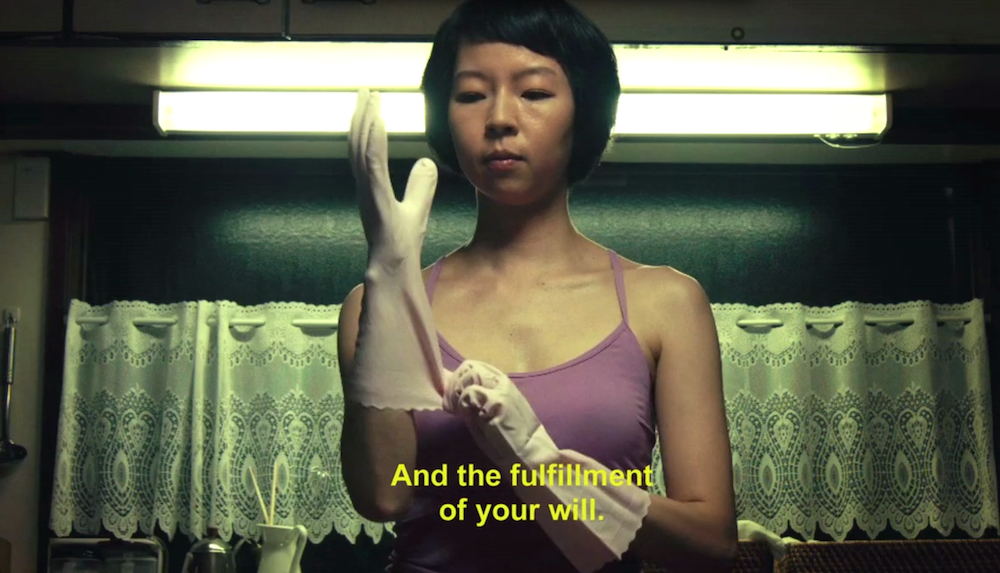Alexi Gonzalez ticks all the boxes of the movie industry’s current obsessions: she’s a young, strong-willed, plain-spoken female director from a second generation American-Hispanic background. She is also a fellow at the Ghetto Film School, a non-profit program that teaches filmmaking to teens in the Bronx and Los Angeles. Selected as the best script from her class’s thesis project submissions, and produced with a team of her classmates, Alexi’s first short film premiered at LA’s Hammer Museum yesterday.
“Demon’s Gate” is a modern Tokyo story, an art-house thriller that’s both eerie and mesmerizingly stylish. And, as the film’s director, Gonzalez doesn’t shy away from her serious subject matter; the movie explores anti-kawaii femininity, mass murder and self-mutilation, all shot with impeccable lighting.
The film screening and gala dinner last night were hosted by the chairman of Fox Filmed Entertainment, Jim Gianopulos, and director David O. Russell, both enthusiastic supporters of the Ghetto Film School. It was an exciting, cross-generational event that suggested the studios are finally getting the memo from the film world’s millennial prodigies. Russell told Alexi he thought the film was “wildly imaginative, visual, tight, succinct, elegant, emotional, well scored, well acted – extraordinary.” He added, “I wasn’t even on the starting block at your age.”
Alexi shared a few thoughts with us beforehand – about Japanese cinema, deadly fugu sushi and the representation of women in film.
You filmed “Demon’s Gate” in just one week. What were the specific challenges?
What to start with…? GFS announced that our thesis project would be a shoot in Tokyo. We had one week to write scripts, then the class picked the best. I didn’t know anything about Japan so I started doing online research. I ended up looking for different communities. I studied the census of the homeless, and how the numbers are considered controversial in Japan (officially, the homeless are a minority of 1,000 people in Tokyo). I already knew I wanted a female protagonist. Ultimately, I got all the pieces of my puzzle together and my script was picked. I wrote 11 drafts. Then I had to convince GFS and the class to [let me] double up as the director.
After that, it was all about making a movie in Japanese without knowing the language – from casting the actors over Skype to bonding with them on set using a translator. Oh, and I also had to manage an excruciating closeup scene of a live blowfish being cut into sushi. One of our crew members is now a vegetarian!
Your film is both a beautiful thriller and a moral fable. Were you conscious of striking a balance?
Certainly. Our teachers had us watch a bunch of great Asian films. I got very inspired by Kurosawa’s Rashômon, the way he positions characters in the scene, the feeling that it translates on the screen. I took a lot from David Fincher’s movies, too – I love the cinematography of The Girl with the Dragon Tattoo. I was also excited by the South Korean film Oldboy, with its amazing blue lighting. I knew from the beginning that I wanted to offset the violence in my film. My character gives her victims beautiful lacquered boxes of poisoned sushi.
Hollywood is talking about diversity and empowering women a lot at the moment. Do you feel like a spokeswoman for your generation?
Absolutely! My family comes from a Hispanic background – from Cuba and Ecuador on my mother’s side, Columbia on my father’s. I want to be a director for many reasons, but one of them is giving representation [to characters who are not] the stereotyped, sexualized Hispanic woman of American movies. Alvy [Johnson], one of our GFS teachers, told us early on about the Bechdel Test for Women in Movies. Google it! Basically, it asks, “How many films can you name in which two women talk to each other about something besides a man?” It was a real wakeup call for me.
Tell us about Ghetto Film School and its mission.
Joe Hall, the founder of GFS, is also the founder of the only film high school in the US, the Cinema High School. It’s in the Bronx, where my family moved temporarily. I got into the school, then into the non-profit GFS summer film program. It was a tough transition when we moved back to California (I grew up in Inland Empire, two hours southeast of LA). But by some miracle, GFS opened the MacArthur Park program in 2014. It’s a 30-month free training scheme. If you want to become a storyteller, it’s definitely your place. You have to work harder than you’ve ever worked before, but there’s so much respect and trust in the GFS family! It gave me so many incredible opportunities.
What’s your next goal?
Thanks to GFS, I hope to get “Demon’s Gate” into festivals, and I’m also starting an internship with the ABC show How to Get Away with Murder. First, I’ll be in the writers’ room, but I hope to get bumped to the production office, because that’s where I want to work when I’m older. For now, my immediate goal is to become a director of photography and a feature film director. I will have my first feature wrapped before I am 21.
Credits
Text Carole Sabas
Still from “Demon’s Gate”
